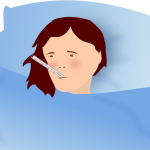Taking Care of the Person You Know Best: The Mental Health Benefits of Self-Care
Today’s post is by a colleague of mine, Brad Krause. I’ve included it here because the principles covered can help us avoid sugar and other junk foods, as well as alcohol or drugs. I hope you find it useful.
— Joan Kent, PhD
Taking Care of the Person You Know Best: The Mental Health Benefits of Self-Care
by Brad Krause
We’ve all known that one person who is completely self-centered: everything that happens is about them, they’ve never heard a story they can’t top, and they somehow manage to be, as the saying goes, the bride at every wedding and the corpse at every funeral. But there seems to be some confusion between being self-centered and self-caring. In truth, they are worlds apart. In fact, Dr. Lisa Firestone writing at Psychology Today calls self-care an “unselfish art.” Put another way, being self-centered is a selfish way to live. You are drawing all the attention to yourself. Self-care, on the other hand, means we take responsibility for our own well-being, both physically and mentally.
We can easily forget to take care of ourselves with all the stressful situations we go through each day, whether they’re at work or at home. Regardless of where it happens, here are a few ways for you to take care of the person you know best: yourself.
- Don’t Let Workplace Stress Become a Dangerous Problem
According to Justin Reynolds at Tinypulse.com, a study from Everest College showed that 83 percent of American professionals are stressed on the job. That stress results in frequent employee absenteeism, which contributes to the loss of productivity. What’s more, stress can cause more workplace accidents. While feeling stressed at work, there might be the temptation to reduce it by turning to alcohol or other dangerous substances. While a beer or some wine after work with fellow employees might not be a bad thing, frequent use of alcohol (or drugs) is. One of the best ways to deal with stress on the job (and off as well) is to eat a balanced diet of healthy foods, such as leafy greens (especially spinach), proteins like fish and chicken, fruit, yogurt, and cheese. How do these foods combat stress? Many of these are full of magnesium, omega-3s, protein, and B vitamins, all of which help regulate stress-producing hormones (such as cortisol), which increase glucose in the bloodstream.
Other things you can do at work to reduce stress and help you cope is take a meditation break (more about that later), get plenty of restful sleep at night, get regular exercise, and find support among your peers with tasks you need to accomplish. The point is that work should be the place where you enjoy making a living for yourself and your family, not where you end up tense and angry all the time.
- Meditate, Don’t Medicate
If someone says the word “meditation” to you and the first thing you think of is a guy in a white gown sitting cross-legged in front of an incense burner chanting, you would be wrong. Simply put, meditation is a way for you to sit quietly and focus your mind to put yourself in the here and now. Learning it is easy, you don’t need any special equipment, and it can lead to positive thinking, clarity, reduced stress, an improved attitude, and more. And if you want to do it cross-legged chanting in front of an incense burner, go ahead. (But make sure your get permission from your boss if you’re going to do it that way at work!)
- Get Yourself a Hobby
The mental health benefits of hobbies are clear. According to Marguerite Ward of CNBC, hobbies can, among other things, reduce stress by getting you to focus on a fun task and improve your mental and physical health by lowering cortisol and blood pressure. There are many hobbies that are portable enough to take with you to work on during a break, such as knitting, sewing, and cross-stitching. The point is that when you occupy your hands, you can occupy your mind, which can help you relax.
“Take care of yourself” is more than just a way to finish a conversation with a friend. It’s actually a way for us to improve our mental health by making sure we reduce stress we feel every day, and by taking care of the person we know best: ourself.



